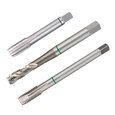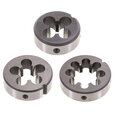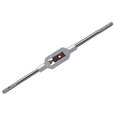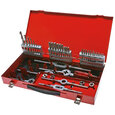Unified Thread Standard
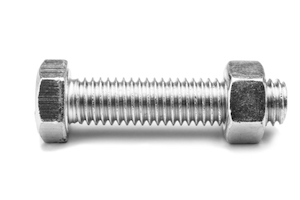
Figure 1: Bolt and nut
The Unified Thread Standard (UTS) is the main standard in the United States and Canada for the form and series of bolts, nuts, and other threaded fasteners. This standard, ASME B1.1-2019, is controlled by the American Society of Mechanical Engineers (ASME) and the American National Standards Institute (ANSI).
Table of contents
Explore Tameson's selection of thread cutting tools
UTS basic profile
Unified screw threads are defined by their major diameter (Figure 2 labeled H) and pitch (Figure 2 labeled A). These threads are symmetrical and have a 30° flank angle (Figure 2 labeled C), which is the angle from the crest (Figure 2 labeled D) to the groove (Figure 2 labeled E). Therefore, a UTS thread has a 60° profile similar to an ISO metric screw thread. The difference between UTS and ISO is that UTS measures pitch as an inch fraction, whereas ISO measures pitch in millimeters. In UTS, the pitch value is the reciprocal of the threads-per-inch (TPI). For example, if a bolt has 20 TPI, its pitch is 1/20” or 0.05”. Finally, UTS threads are single-start threads. Therefore, the pitch is equal to the thread’s lead, which is the distance a bolt travels when it rotates 360°. Read our thread design article for more details on each thread design parameter.
Figure 2: Thread dimensions: pitch (A), depth (B), flank angle (C), crest (D), groove (E), minor diameter (F), pitch diameter (G), and major diameter (H)
UTS designation
A standard UTS designation has a number that indicates the major diameter followed by a number that indicates the TPI. Following these two numbers is an indication of the thread’s coarseness: Unified Coarse Thread (UNC), Unified Fine Thread (UNF), or Unified Extra Fine Thread (UNEF). UTS designates threads with a ¼” major diameter and above using the diameter in the designation. For threads with smaller major diameters, UTS assigns a number. For example, a #1-64 UNC bolt has a major diameter of 0.0073” and a TPI of 64.
Unified Coarse Thread
UNC bolts are for mass production and applications that require rapid installation. The extra space between the threads allows for more variation in manufacturing and application without failure. A 1-inch UNC bolt has 8 TPI so is designated as 1-8 UNC.
Unified Fine Thread
UNF threads are for applications that require tight and fine threads, such as aerospace and automotive applications. A 1-inch UNF bolt has 12 TPI so is designated as 1-12 UNF.
Unified Extra Fine Thread
UNEF threads are for tapped holes in hard material, thin walls, and thin material. A 1-inch UNEF bolt has 20 TPI so is designated as 1-20 UNEF.
UTS thread tolerance
A number indicated the UTS thread tolerance may follow the fastener’s designation. UTS uses the following tolerance classes:
- Class 1: These threads fit loosely. They are suitable for easy assembly and dirty work environments.
- Class 2: These threads are free fit, meaning they have greater tolerance. They are the most common and maximize strength.
- Class 3: These threads are common and have a closer tolerance for high-quality work.
- Class 4: This class is more theoretical than practical. It was meant for a fit even closer than Class 3. It is now obsolete.
- Class 5: Class 5 threads are interference threads. This means they require a wrench to screw and are meant for semi-permanent to permanent installations.
UTS charts
The following charts give information on coarse, fine, and extra fine Unified Threads. Click the button below to download a PDF copy of the charts.
Unified Coarse Thread
| Nominal Diameter | Major Diameter (in) | Major Diameter (mm) | TPI | Pitch (in) | Pitch (mm) | Tap drill size |
| #0 | 0.06 | 1.524 | - | - | - | - |
| #1 | 0.073 | 1.854 | 64 | 0.016 | 0.397 | #53 |
| #2 | 0.086 | 2.184 | 56 | 0.018 | 0.454 | #51 |
| #3 | 0.099 | 2.515 | 48 | 0.021 | 0.529 | 5/64” |
| #4 | 0.112 | 2.845 | 40 | 0.025 | 0.635 | #43 |
| #5 | 0.125 | 3.175 | 40 | 0.025 | 0.635 | #38 |
| #6 | 0.138 | 3.505 | 32 | 0.031 | 0.794 | #36 |
| #8 | 0.164 | 4.166 | 32 | 0.031 | 0.794 | #29 |
| #10 | 0.19 | 4.826 | 24 | 0.042 | 1.058 | #25 |
| #12 | 0.216 | 5.486 | 24 | 0.042 | 1.058 | #17 |
| 1⁄4″ | 0.25 | 6.350 | 20 | 0.050 | 1.270 | #7 |
| 5⁄16″ | 0.3125 | 7.938 | 18 | 0.056 | 1.411 | F |
| 3⁄8″ | 0.375 | 9.525 | 16 | 0.063 | 1.588 | 5/16” |
| 7⁄16″ | 0.4375 | 11.113 | 14 | 0.071 | 1.814 | U |
| 1⁄2″ | 0.5 | 12.700 | 13 | 0.077 | 1.954 | 27/64” |
| 9⁄16″ | 0.5625 | 14.288 | 12 | 0.083 | 2.117 | 31/64” |
| 5⁄8″ | 0.625 | 15.875 | 11 | 0.091 | 2.309 | 17/32” |
| 3⁄4″ | 0.75 | 19.050 | 10 | 0.100 | 2.540 | 21/32” |
| 7⁄8″ | 0.875 | 22.225 | 9 | 0.111 | 2.822 | 49/64” |
| 1″ | 1 | 25.400 | 8 | 0.125 | 3.175 | 7/8” |
| 1 1⁄8″ | 1.125 | 28.575 | 7 | 0.143 | 3.629 | 63/64” |
| 1 1⁄4″ | 1.25 | 31.750 | 7 | 0.143 | 3.629 | 1-7/64” |
| 1 3⁄8″ | 1.375 | 34.925 | 6 | 0.167 | 4.233 | 1-11/32” |
| 1 1⁄2″ | 1.5 | 38.100 | 6 | 0.167 | 4.233 | 1-35/64’ |
| 1 3⁄4″ | 1.75 | 44.450 | 5 | 0.200 | 5.080 | 1-25/32” |
| 2″ | 2 | 50.800 | 4 1⁄2 | 0.222 | 5.644 | - |
| 2 1⁄4″ | 2.25 | 57.150 | 4 1⁄2 | 0.222 | 5.644 | - |
| 2 1⁄2″ | 2.5 | 63.500 | 4 | 0.250 | 6.350 | - |
| 2 3⁄4″ | 2.75 | 69.850 | 4 | 0.250 | 6.350 | - |
| 3″ | 3 | 76.200 | 4 | 0.250 | 6.350 | - |
| 3 1⁄4″ | 3.25 | 82.550 | 4 | 0.250 | 6.350 | - |
| 3 1⁄2″ | 3.5 | 88.900 | 4 | 0.250 | 6.350 | - |
| 3 3⁄4″ | 3.75 | 95.250 | 4 | 0.250 | 6.350 | - |
| 4″ | 4 | 101.600 | 4 | 0.250 | 6.350 | - |
Unified Fine Thread
| Nominal Diameter | Major Diameter (in) | Major Diameter (mm) | TPI | Pitch (in) | Pitch (mm) | Tap drill size |
| #0 | 0.06 | 1.524 | 80 | 0.013 | 0.318 | 3/64” |
| #1 | 0.073 | 1.854 | 72 | 0.014 | 0.353 | #53 |
| #2 | 0.086 | 2.184 | 64 | 0.016 | 0.397 | #50 |
| #3 | 0.099 | 2.515 | 56 | 0.018 | 0.454 | #46 |
| #4 | 0.112 | 2.845 | 48 | 0.021 | 0.529 | #42 |
| #5 | 0.125 | 3.175 | 44 | 0.023 | 0.577 | #37 |
| #6 | 0.138 | 3.505 | 40 | 0.025 | 0.635 | #33 |
| #8 | 0.164 | 4.166 | 36 | 0.028 | 0.706 | #29 |
| #10 | 0.19 | 4.826 | 32 | 0.031 | 0.794 | #21 |
| #12 | 0.216 | 5.486 | 28 | 0.036 | 0.907 | #15 |
| 1⁄4″ | 0.25 | 6.350 | 28 | 0.036 | 0.907 | #3 |
| 5⁄16″ | 0.3125 | 7.938 | 24 | 0.042 | 1.058 | I |
| 3⁄8″ | 0.375 | 9.525 | 24 | 0.042 | 1.058 | Q |
| 7⁄16″ | 0.4375 | 11.113 | 20 | 0.050 | 1.270 | W |
| 1⁄2″ | 0.5 | 12.700 | 20 | 0.050 | 1.270 | 29/64” |
| 9⁄16″ | 0.5625 | 14.288 | 18 | 0.056 | 1.411 | 33/64” |
| 5⁄8″ | 0.625 | 15.875 | 18 | 0.056 | 1.411 | 37/64” |
| 3⁄4″ | 0.75 | 19.050 | 16 | 0.063 | 1.588 | 11/16” |
| 7⁄8″ | 0.875 | 22.225 | 14 | 0.071 | 1.814 | 13/16” |
| 1″ | 1 | 25.400 | 12 | 0.083 | 2.117 | 15/16” |
| 1 1⁄8″ | 1.125 | 28.575 | 12 | 0.083 | 2.117 | 1-3/64” |
| 1 1⁄4″ | 1.25 | 31.750 | 12 | 0.083 | 2.117 | 1-11/64” |
| 1 3⁄8″ | 1.375 | 34.925 | 12 | 0.083 | 2.117 | - |
| 1 1⁄2″ | 1.5 | 38.100 | 12 | 0.083 | 2.117 | 1-59/64 |
Unified extra fine thread
| Nominal Diameter | Major Diameter (in) | Major Diameter (mm) | TPI | Pitch (in) | Pitch (mm) | Tap drill size |
| #12 | 0.216 | 5.486 | 32 | 0.031 | 0.794 | #16 |
| 1⁄4″ | 0.25 | 6.350 | 32 | 0.031 | 0.794 | #7 |
| 5⁄16″ | 0.3125 | 7.938 | 32 | 0.031 | 0.794 | F |
| 3⁄8″ | 0.375 | 9.525 | 32 | 0.031 | 0.794 | 5⁄16” |
| 7⁄16″ | 0.4375 | 11.113 | 28 | 0.036 | 0.907 | U |
| 1⁄2″ | 0.5 | 12.700 | 28 | 0.036 | 0.907 | 27/64” |
| 9⁄16″ | 0.5625 | 14.288 | 24 | 0.042 | 1.058 | 31/64” |
| 5⁄8″ | 0.625 | 15.875 | 24 | 0.042 | 1.058 | 17/32” |
| 3⁄4″ | 0.75 | 19.050 | 20 | 0.050 | 1.270 | 21/32” |
| 7⁄8″ | 0.875 | 22.225 | 20 | 0.050 | 1.270 | 49/64” |
| 1″ | 1 | 25.400 | 20 | 0.050 | 1.270 | 7/8” |
Read our articles on NPT and BSP standards for more information on the features of each standard.
FAQs
What is UNF thread standard?
Unified Fine Thread (UNF) standard is part of the Unified Thread Standard (UTS). It describes the major diameter and pitch of fine threaded fasteners used primarily in the United States and Canada.
What is UNC thread standard?
Unified Coarse Thread (UNC) standard is part of the Unified Thread Standard (UTS). It describes the major diameter and pitch of coarse threaded fasteners used primarily in the United States and Canada.
Are metric and UTS standards the same?
The ISO metric standard and UTS have the same 60° profile. However, metric measures in millimeters and UTS measures in inch fractions.




